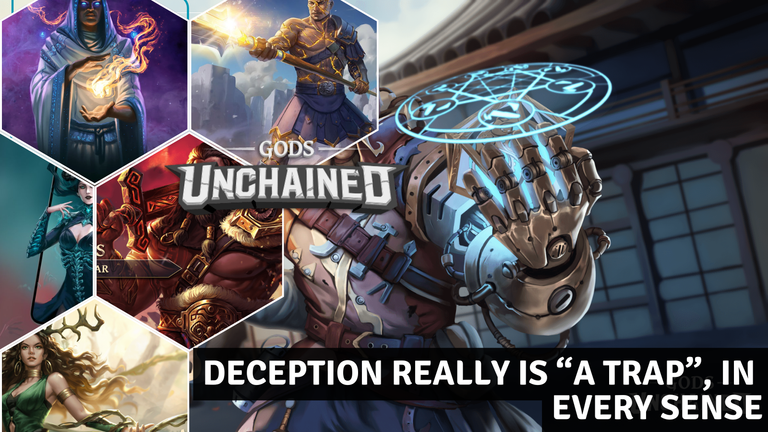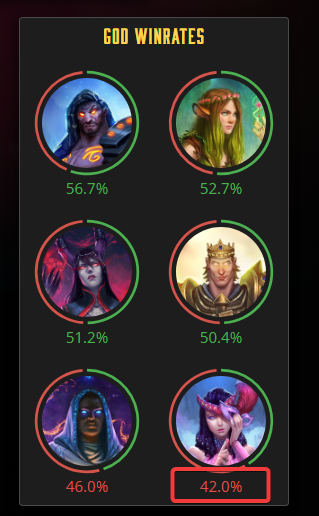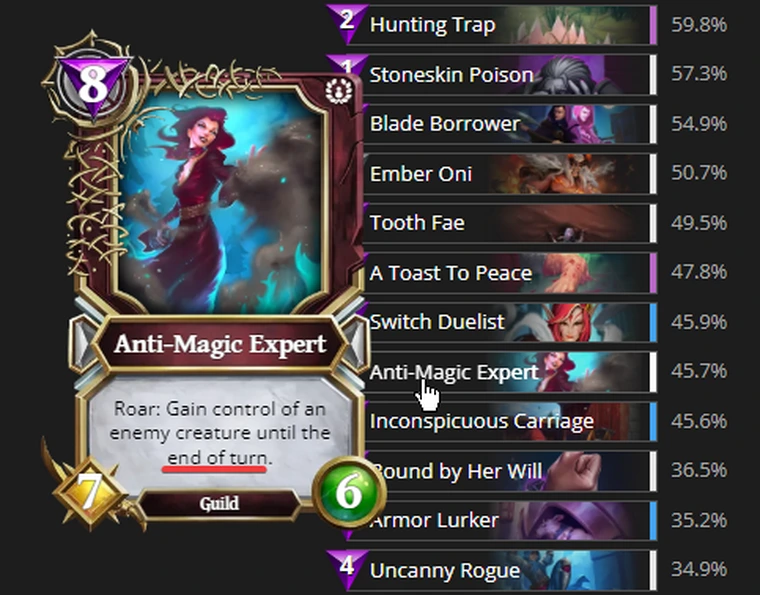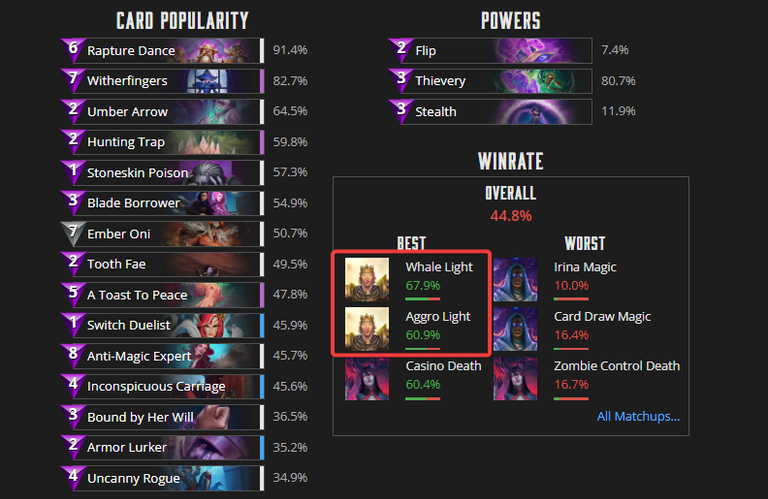
📝 English Version

Do you know that deck that seems like it has everything to succeed, but fails to deliver a good ending?
Well, that’s the Deception Deck in Gods Unchained.
If you've ever played with it, you've probably felt the frustration of having your strategy all set, only to lose in an epic way (and not in a good sense).
We need to seriously talk about why this deck has the worst win rate in the game, a mere 42%. And look, it's not just because you or I are playing it wrong.
The problem goes way beyond that.
To start with, Deception, which used to be one of my go-to decks, has been outperformed by decks like Light and Magic, not only in popularity but also in effectiveness. Light, for example, has a win rate of 50%, which is already considerable. And even though it’s a more common choice, it manages to yield much better results. But why does Deception lag behind, even with so many seemingly “strong” builds in terms of attributes?
Well, Deception is the kind of deck that requires patience, strategy, and, most importantly, time.

Many of the most-used decks rely on Control and Hidden, which, in theory, seem like an excellent combination. You hide, wait for the right moment, and strike. But in practice, it's not that simple. The problem is that these strategies take several turns to be effective, and in a game where agility in bringing down the opponent's God can decide everything, this becomes a fatal flaw.
If we take a closer look, Deception lacks a card with consistent attributes that can survive and attack with force simultaneously.
One card I often see being used is Anti-Magic Expert. It has 7 attack and 6 defense, which isn’t bad, but it costs 8 mana. And that’s the issue it’s expensive. By the time you finally get to play it, you expect it to solve everything. After all, it has an “interesting” ability, allowing you to control any opponent's creature for one turn. Sounds promising, right? But in reality, it ends up hindering more than helping.

This temporary control gives a false sense of security.
Okay, you’ve dominated a creature for one turn, and then? It goes back to the opponent, and if they have something big in hand, you’re done for.
Another critical point is that Deception struggles to hold its ground on the field. Compared to other decks that can build a solid board and maintain control, Deception relies heavily on more punctual plays and “dodging” with the Hidden abilities.

The problem is these maneuvers only work for a limited time.
When things start heating up, it runs out of steam. Not to mention that if the opponent has any card that reveals hidden creatures, your strategy is pretty much gone.
Now, if you’re still thinking Deception can work if played well, I understand. I’ve also believed that, especially because of cards like Hunting Trap, which is a popular card in this deck. It’s low-cost and can take out an opponent’s creature based on its attack. So far, so good.
But again, we have a timing issue.
Hunting Trap is a simple and efficient card, but it depends on the right situation to be truly useful. If the opponent has several creatures on the field, it loses much of its value, and you end up spending mana without solving the main problem.
Then, we have another player-favorite choice, Rapture Dance, another ability card.
Its ability deals damage to all of your opponent’s creatures, based on how many creatures are on the board. This could be interesting for another CONTROL battle. However, it still comes with a high mana cost of 6.

In the end, Deception ends up being a deck of almosts. It almost has total control of the game, almost finishes off the opponent, and almost makes a decisive play. But “almost” doesn’t win games.
What frustrates the most is the feeling that the deck has potential, but it relies so much on specific circumstances and time that you often don’t have, making it difficult to use consistently.
Perhaps the solution lies in some future rework or the release of new cards that help cover its current weaknesses. But for now, the reality is that Deception is far from competitive.


About the Author
A Web3 Gaming enthusiast. He dedicates some of his time to Play-to-Earn games and the ecosystem they integrate. A weekly author, publishing various posts related to this through the Hive Blockchain. If you’re not part of it yet, consider registering via my Referral Link to follow all my shared content here.
📝 Versão em Português

Sabe aquele deck que parece que tem tudo pra dar certo, mas não entrega um final bom?
Pois é, esse é o Deception Deck no Gods Unchained.
Se você já jogou com ele, provavelmente sentiu na pele a frustração de estar com a estratégia toda montada, só para perder de forma épica (e não no bom sentido).
A gente precisa falar sério sobre o motivo pelo qual esse deck tem o pior win rate do jogo, míseros 42%. E olha, não é só porque eu ou você estamos jogando errado.
O problema vai muito além disso.
Pra começar, o Deception, que já foi um das minhas escolhas para começar a jogar, tem sido superado por decks como Light e Magic, e não só superado em popularidade, mas também em eficiência. O Light, por exemplo, tem um win rate de 50%, o que já é considerável. E mesmo sendo uma escolha mais comum, ele consegue resultados muito melhores. Mas por que o Deception fica para trás, mesmo com tantas construções e possibilidades aparentemente "fortes" em questão de atributos?
Bom, o Deception é aquele tipo de deck que exige paciência, estratégia, e, o mais importante, tempo.

Muitos dos decks mais utilizados se baseiam em Control e Hidden, o que, na teoria, parece ser uma excelente combinação. Você se esconde, espera o momento certo e ataca. Mas a prática não tem sido tão simples assim. O problema é que essas estratégias dependem de vários turnos para serem eficazes, e em um jogo onde a agilidade em derrubar o Deus adversário pode decidir tudo, isso acaba sendo um tiro no pé.
Se pararmos para analisar, falta ao Deception uma carta com atributos consistentes que possa sobreviver e ao mesmo tempo atacar com força.
Uma carta que eu vejo ser bastante utilizada é o Anti-Magic Expert. Ele tem 7 de ataque e 6 de defesa, o que não é ruim, mas custa 8 de mana. E aí é que tá o problema ele é caro. E quando finalmente chega a sua vez de jogá-lo, você espera que ele vá resolver tudo. Afinal, ele tem uma habilidade "interessante", que permite controlar qualquer criatura do adversário por um turno. Parece promissor, né? Mas, na verdade, acaba atrapalhando mais do que ajudando.

Esse controle temporário dá uma falsa sensação de segurança.
Ok, você dominou uma criatura por um turno, e depois? Ela volta pro oponente, e se o cara tiver algo grande na mão, você já era.
Outro ponto crítico é que o Deception tem dificuldade em se sustentar no campo. Comparado a outros decks que conseguem montar uma mesa sólida e manter o controle, o Deception depende muito de jogadas mais pontuais e de "esquivas" com o uso das habilidades Hidden.

O problema é que essas manobras funcionam apenas por um tempo limitado.
Quando a coisa começa a ficar intensa, falta fôlego. Isso sem contar que, se o oponente tiver qualquer carta que revele criaturas escondidas, sua estratégia já foi por água abaixo.
Agora, se você ainda está pensando que o Deception pode funcionar se bem jogado, eu te entendo. Eu também já acreditei nisso, especialmente por conta de cartas como a Hunting Trap, que é uma carta bem popular nesse deck. Ela tem um custo baixo e pode eliminar uma criatura adversária, baseado no seu ataque. Até aí, beleza.
Mas, mais uma vez, temos um problema de timing.
A Hunting Trap é uma carta simples e eficiente, mas depende da situação certa para ser realmente útil. Se o oponente tiver várias criaturas no campo, ela perde boa parte do seu valor, e você acaba gastando mana para não resolver o problema principal.
Então temos outra escolha como "preferida" dos demais jogadores, no caso Rapture Dance. Outra carta de habilidade.
Sua habilidade causa dano em todas as criaturas do seu adversário, baseado em quantas criaturas estão na mesa. Essa talvez seja interessante para outra batalha contra CONTROL. Embora ainda sim, tenha seu custo alto de 6 de mana.

No fim das contas, o Deception acaba sendo um deck de quase. Ele quase tem o controle total do jogo, quase consegue finalizar o oponente, e quase faz uma jogada decisiva. Mas "quase" não ganha partidas.
O que mais frustra é a sensação de que o deck tem potencial, mas ele depende tanto de circunstâncias específicas e de um tempo que você muitas vezes não tem, que fica difícil usá-lo com consistência.
Talvez a solução esteja em alguma futura reestruturação ou no lançamento de novas cartas que ajudem a melhorar as fraquezas atuais. Mas, por enquanto, a realidade é que o Deception está muito longe de ser competitivo.


Sobre o Autor
Apreciador de Web3 Gaming. Entusiasta e dedica um pouco do seu tempo a jogos no estilo Play-to-Earn e pelo ecossistema que eles integram. Autor semanal publicando diversas postagens referente a isso através da Hive Blockchain. Se você ainda não faz parte disso, considere se registrar através do meu Link de Referencia para acompanhar todo meu conteúdo compartilhado aqui.
Hi! I think you got a wrong idea about Deception. Here is a list of Deception decks from GU Decks. Notice how they are played in Mythic in the last 7 days and have a win rate above 60%.
https://gudecks.com/meta/top-decks?god=deception&timeFrame=7
You have to understand that there are other Ranks, and people have their own opinions...
Sure, but one thing is opinions, another is hard facts from numbers in the top rank of the game. Here is a similar screenshot from Solar Gold. Win rates look pretty solid to me :)
The overall win rate being low just means that there are a lot of players who don't understand how to make the most out of the winning strategies in Deception. In capable hands, Deception is as competitive as any other God. It is however not as easy and straightforward as a pure aggro deck, and perhaps that is the reason why in the aggregate the win rate drops so much.
Compared to the same level of ranking with the other Gods, he still loses out, tying again with Light, who seems to be a bit of an underdog as a favorite.
You can see that most of these compositions recycle opponent's creature control cards. This is the difficulty in trying to guess whether the opponent will play a useful or useless creature to spend your resource to dominate it.
In general, the times aren't good for Deception nowadays, I agree.
Top deck info isn't representative, people get a win streak, like, 30 games, 21 win, 70% win rate. It happens especially often when a guy first pushed down to lower ranks on WR and then skyrocketed back to the higher liege. Many decks rely on luck a lot so they sometimes have a long row of wins or losses. Then, the "capable hands" can de-rank again but his lucky deck becomes a monument in top decks table on gudecks.
I agree with you. There is no way to maintain an average based on top ranks. These are collections with a high cost for what they can deliver to the player. While there are simpler and cheaper options like WAR AGGRO.
I understand the win streak argument, but if you look at the matchup tables at https://gudecks.com/meta/matchups?god=deception&timeFrame=7&userRank=10 you'll find the Deception decks that have an overall win rate against other archetypes above 50%. In the case of Solar Gold and counting 7 days worth of matches, Mayday, Hidden Rush and Aggro have win rates above 50%. The latter 2 are generally pretty cheap decks. You don't get these numbers with win streaks only, these percentages take into consideration matches for all players.
There is for sure a case to be made by looking at the aggregate win rate of all the matches for each God. But that doesn't necessarily indicate that the decks from that particular God are not competitive. It could mean that players are just not able to make the most of the cards. It is also possible that players in the lower ranks are not using the more expensive cards that are necessary to make the decks competitive. On the other hand, Guild Deception is a notably cheap and effective deck, although pointed by many as a high skill deck that needs good understanding of the matchups and strategies to be successful.
Looking at Light (before the new expansion) and how the individual decks performed, I think there was a power issue. Light decks in the current meta are generally simple to pilot, but yet they under-perform against many of the other meta decks - and this results in an overall lower win rate.
But the point I was trying to make initially with the screenshots is that this is not the case for Deception. For sure players lose a lot of games, but the reason for that is not the lack of solid, competitive decks.
Obrigado por promover a comunidade Hive-BR em suas postagens.
Vamos seguir fortalecendo a Hive
Your post was manually curated by @crazyphantombr.
Delegate your HP to the hive-br.voter account and earn Hive daily!
🔹 Follow our Curation Trail and don't miss voting! 🔹
Bzzzrrr, eu também já senti a frustração de jogar com o Deception e não ter um final bom! Parece que ele precisa de mais estratégia e paciência. #hivebr